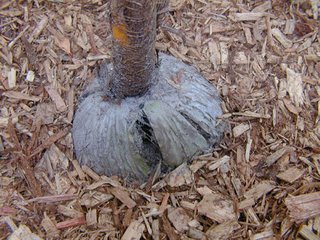Seeds of Wisdom (well, seeds anyway)
For those of you who have been sitting on the edge of your seats, waiting with bated breath for the news about my MP3 player, I can now announce (drum roll please), are you ready...... are you sure you're ready?..... IT WORKS!!!! I'm happy anyway.
A friend of mine was asking me the other day about the meaning of my heading. He doesn't think that seeds are all that remarkable. I've noticed that not very many people are all that het up on seeds but I've always been fascinated with them. There is just something about a piece of matter weighing a few grams turning into a tree that can weigh tons.
First some of my personal belief background. I believe in a Creator. To me it only makes sense. Charles Darwin found several species of finch on his famous voyage, all of which had "evolved" different beaks depending on the major food supply. But you know what? They were all finches. Not a single one of them evolved into a vulture. Now, do I believe in natural selection? Of course. The famous English moth thing shows natural selection. But when all of England was burning coal and white moths showed up so well, there were still white moths among the dark. And when England stopped burning coal as the major fuel, there were still dark moths among the white. Neither group ever died out, some of them were able to live to breeding age, that's all. And even if I believed in evolution, I'm not sure I could believe that man descended from apes. Actually, if I believed in evolution, I'd probably argue that apes descended from man. After all, they are stronger, use tools without tearing up the environment and are much better suited to their environment than man is. They're not the ones spending hundreds of dollars on clothes and spending hours in traffic driving to a job they don't want to go to. Well, enough about that, except to say that I am a creationist not a believer in intelligent design. My Creator made me and He watches over me because He cares. He didn't design me and then stand back to see if I'll make it.
Back to seeds. Think about this for a minute. Two genetically haploid things get together and join to make a diploid set of cells that keep on splitting and differentiating to become this huge plant. Yes, I know that animals do the same thing, but not quite. First of all, people and animals don't have cells that join together and then sit around for days, weeks, months, sometimes centuries before they get on with what they were doing. (Yes centuries. A couple of years ago some botanists (probably on a government grant) germinated wheat seeds that were an estimated 20,000 years. BTW, guess what came up? Wheat!) Anyway, people and animals join cells and start things right off. Another things that nothing but flowering plants (as opposed to fern, molds, and gymnosperms like pines, not to mention all the other phyla) have that nothing else in the world has is a genetically triploid group of cells! The triploid cells make up the endosperm that the plant uses to nourish the seed and baby plant.
A long time ago, my sister had one of those mustard seed necklaces that someone gave her. She didn't wear it that often, but that thing just fascinated me. The seed was so small. you could have closed a thousand of them in your hand and not had any slip out. But then I found out that the plant that comes from this small seed, Brassica nigra, grows into a shrub, 3 to 5 feet tall, and larger across. That once fully grown it is almost impossible to kill. This small, almost infinitesimal, seed, becomes a plant that can last a hundred years or more.
It amazes me. Out of the thousands of species of grasses; most of which bloom at the same time, and all of which are wind-bourne pollinated, each plant will almost always accept its own species of pollen. Yes, there is rarely a cross breed in nature, about one in a several billion, and there have been man-made cross breeds (which take so much work that if you come up with a viable grass, about 999 out of 1000 times you have to produce it vegetatively because it will not breed true, but if you can get one that breeds true, patent that sucker because it is worth millions!)
Speaking of pollen, if you have pollen allergies and you are taking bee pollen to reduce the effects, don't bother. Nobody in the world has respiratory allergies to bee pollinated plants, because the only way you can get the pollen into your respiratory system is to stick a bee up your nose, and if you are doing that, you have bigger problems than allergies. But if you are taking bee pollen don't stop, because it is one of the best sources of easily digested protein in the world, it just won't stop your sneezing. Most pollen allergies are to grasses, trees (especially pines trees, even if you aren't allergic, get down wind of a pine in pollination and that little yellow stuff will make you sneeze), and amazingly enough, molds (which strictly speaking isn't a pollen allergy but tends to hit at about the same time). I never thought I was allergic to anything until we moved to the uptown area where there are still elms. Now when the American elms are in bloom, I'm stuffed up, when any of the other elms are in bloom, nothing, go figure.
Back to seeds. Not only does each seed have to be made with its own ovule and pollen, but each is germinated in its own way! There are seeds that have to pass through the digestive system of a bird or animal so the stomach acids can eat through the tough seed coat so the seed can
 sprout. This also has the added benefit of starting out with its own little fertilizer supply. Some seeds have to be subjected to fire which heats the water inside the seed, expanding it, breaking the seed coat and allowing the seed to send up a sprout. There is some question in the ecological community whether sequioahs are going to die out because the forests are not having any fires anymore (because man immediately come around and try to put them out). Some seeds fall on the beach and get swept up in the tide and float for hundreds of miles and land on the beach of an island that a volcano just thrust out of the sea, and in a little while, a coconut palm starts to break down the solid rock into volcanic sand.
sprout. This also has the added benefit of starting out with its own little fertilizer supply. Some seeds have to be subjected to fire which heats the water inside the seed, expanding it, breaking the seed coat and allowing the seed to send up a sprout. There is some question in the ecological community whether sequioahs are going to die out because the forests are not having any fires anymore (because man immediately come around and try to put them out). Some seeds fall on the beach and get swept up in the tide and float for hundreds of miles and land on the beach of an island that a volcano just thrust out of the sea, and in a little while, a coconut palm starts to break down the solid rock into volcanic sand.I don't know, but the more I learn and the more I study science, especially botany, the more I am convinced. God made each seed to become each plant. God made each bug to become that bug. And God made me.


1 Comments:
What an interesting post. Love the line "shove a bee up my nose"!
And thanks for the book link!
Post a Comment
<< Home